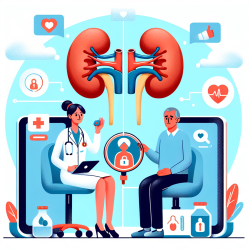Introduction
Chronic Kidney Disease (CKD) poses unique challenges for both patients and healthcare practitioners, especially when it comes to making informed decisions about treatment options. A recent narrative review titled "Barriers to Education and Shared Decision Making in the Chronic Kidney Disease Population" sheds light on the influencers of decision-making in CKD, providing valuable insights for practitioners looking to enhance their skills and patient outcomes.
Understanding the Barriers
The review identifies eight common themes influencing decision-making, categorized into "patient-focused" and "clinician-focused" themes. For patients, social influences, values and beliefs, comprehension, autonomy, and sociodemographics play significant roles. Clinician-focused themes include screening, communication, and engagement.
Understanding these barriers is crucial for practitioners aiming to provide patient-centered care. For instance, low health literacy and a lack of tailored education can hinder patients' ability to make informed decisions. Similarly, time constraints and resource limitations can affect clinicians' ability to communicate effectively with patients.
Strategies for Practitioners
To overcome these barriers, the review suggests several strategies:
- Early Education: Implementing early predialysis education and decision aids can significantly improve decision-making processes.
- Multidisciplinary Teams: Standardized comprehensive education programs through multidisciplinary health teams can optimize patient education and shared decision-making.
- Patient Involvement: Involving patients in the research process and integrating their values and preferences into clinical guidelines can help achieve a patient-centered model of care.
Implications for Practice
Practitioners are encouraged to adopt these strategies to enhance their practice and improve patient outcomes. By focusing on patient-centered care, practitioners can better navigate the complexities of CKD treatment decisions, ultimately leading to more informed and satisfied patients.
Conclusion
The insights from this narrative review offer a valuable roadmap for practitioners seeking to improve their approach to patient education and shared decision-making in CKD. By understanding and addressing the barriers identified, practitioners can play a pivotal role in enhancing patient outcomes and satisfaction.
To read the original research paper, please follow this link: Barriers to Education and Shared Decision Making in the Chronic Kidney Disease Population: A Narrative Review










